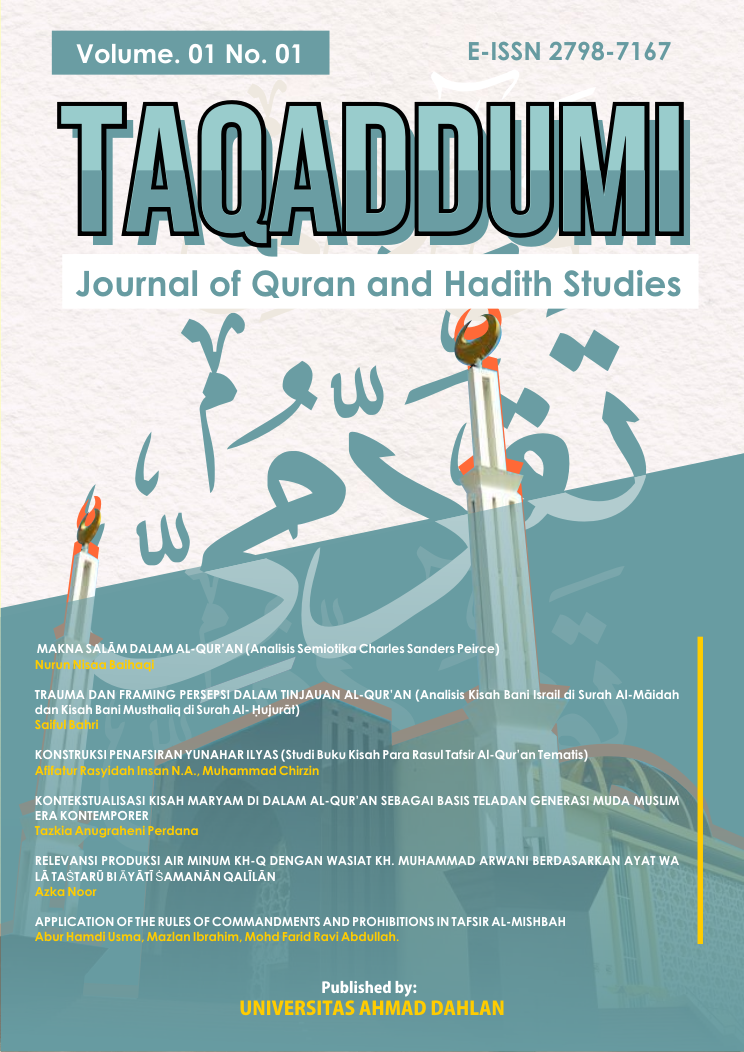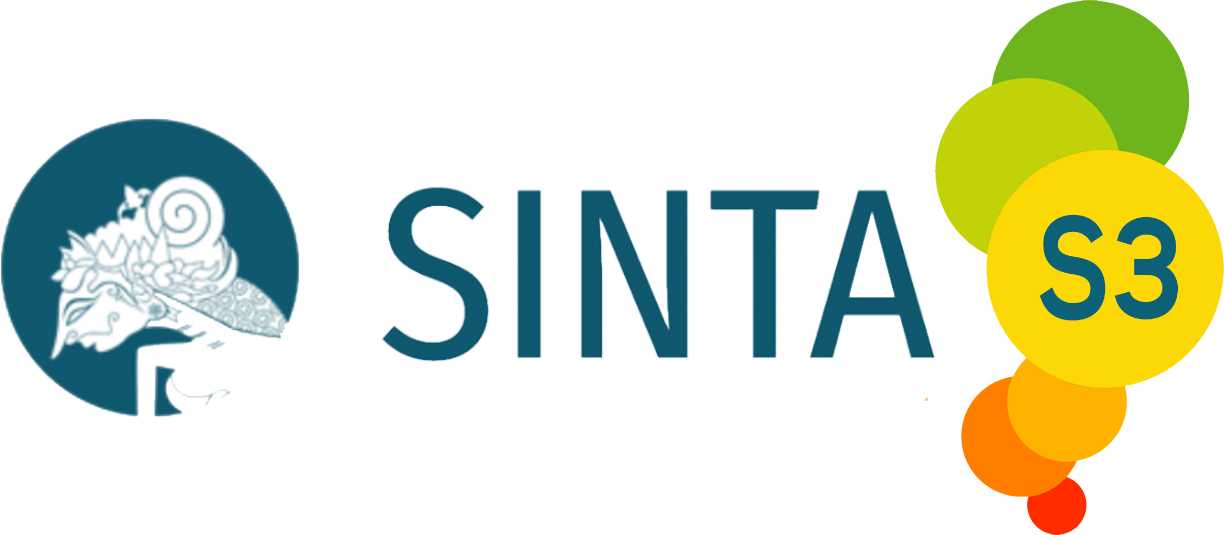APPLICATION OF THE RULES OF COMMANDMENTS AND PROHIBITIONS IN TAFSIR AL-MISHBAH
DOI:
https://doi.org/10.12928/taqaddumi.v1i1.4221Keywords:
M. Quraish Shihab, Rules of Interpretation, Quranic Exegesis, Tafsir al-MishbahAbstract
Shihab, in full M. Quraish Shihab (b. 1944) is a prominent exegete who became one of the leading intellectual figures of 20th-century Indonesia. As a scholar, Shihab is best remembered for his 30-chapter exegesis entitled Tafsir Al-Mishbah. In the Commentary, Shihab had applied several rules that had driven him towards exegeting the verses. This kind of rule is also adopted by the other exegetes to ensure their exegeses are in line with the Islamic law. Therefore, this paper seeks to analyze the rules of interpretation applied by Shihab which focuses on the discussions of commandments (al-amr) and prohibitions (al-nahy). To get a proper understanding and to ensure the rules that Shihab had employed can be analysed perfectly, We adopted the document analysis method by making language scriptures and venerated exegeses as the main sources of references. The study found that Shihab had applied six rules related to al-amr and al-nahy in his Tafsir Al-Mishbah, and the rules have been affirmed by grand exegetes.
References
‘Abd al-Qawī, N. S. Sharḥ Mukhtaṣar Al-Rawḍah. Beirut: Muassasah al-Risalah, 1987.
‘Āshur, M. T. Al-Taḥrīr Wa Al-Tanwīr. Tunisia: Dar Sahnun, 1984.
Abū al-Sa‘ūd, M. Irshād Al-‘Aql Al-Salīm Ilā Mazāyā Al-Kitāb Al-Karīm. Beirut: Dar Ihya’ Al-Turath Al-‘Arabi, 1994.
Al-Āmidī, M. Al-Iḥkām Fī Uṣūl Al-Aḥkām. Beirut: Dar al-Kitab al-‘Arabi, 1984.
Al-Asnāwī, J. A. Nihāyah Al-Sawl Sharḥ Minhāj Al-Wuṣūl. Beirut: Dar al-Kutub al-‘Ilmiyyah, 1999.
Al-Azharī, A. M. M. Tahdhīb Al-Lughah. Egypt: Dār al-Miṣriyyah li al-Ta’lif, 1964.
Al-Ba‘lī, A. Al-Qawā‘Id Wa Al-Fawā’Id Al-Uṣūliah Wa Mā Yata‘allaq Bihā Min Al-Aḥkām. Cairo: al-Sunnah al-Muhammadiah, 1956.
Al-Biqā‘ī, B. D. Naẓm Al-Durar Fī Tanāsub Al-Āyāt Wa Al-Suwar. Cairo: Dar al-Kutub al-Islami, 1992.
Al-Fairūzābādī, M. Y. Al-Qāmūs Al-Muḥīṭ. Beirut: Mu’assasah al-Risālah, 1886.
Al-Fayūmī, M. A. Al-Miṣbāḥ Al-Munīr Fī Gharīb Al-Sharḥ Al-Kabīr. Beirut: Maktabah Lubnan, 1990.
Al-Hashīmī, A. Jawāhir Al-Balāghah Fī Al-Ma‘ānī Wa Al-Bayān Wa Al-Badī‘. Egypt: Maktabah al-Tijāriah al-Kubrā, 1960.
Al-Jārim, A., and M. Amīn. Al-Balāghah Al-Wāḍiḥah. Beirut, n.d.
Al-Jawziyyah, I. Q. Badā’i‘ Al-Fawā’Id. Mecca: Maktabah Nazar Mustafa al-Baz, 1996.
Al-Jurjānī, A. M. Al-Ta‘Rifāt. Beirut: Dar al-Kitab al-Mu‘asir, 1985.
Al-Kafawī, A. B. Al-Kulliyāt: Mu‘jam Fī Al-Muṣṭalaḥāt Wa Al-Furūq Al-Lughawiyyah. Beirut: Mu’assasah al-Risalah, 1998.
Al-Qaṭṭān, M. Mabāḥith Fī ‘Ulūm Al-Qur’ān. Beirut: Muassasah al-Risalah, 1992.
Al-Qurṭubī, A. Al-Jāmi‘ Li Aḥkām Al-Qur’ān. Cairo: Dar al-Kutub al-Misriyyah, 1964.
Al-Sa‘dī, A. N. Al-Qawā‘Id Al-Ḥisān Fī Tafsīr Al-Qur’ān. Riyadh, KSA: Maktabah al-Rushd, 1999.
Al-Sabt, K. U. Qawā‘id Al-Tafsīr: Jam‘an Wa Dirāsah. Riyadh, KSA: Dar ibn ‘Affan, 2001.
Al-Shāfi‘ī, A. M. Qawāṭi‘ Al-Adillah Fī Al-Uṣūl. Beirut: Dar al-Kutub al-‘Ilmiyyah, 1999.
Al-Shanqīṭī, M. A. Aḍwā’ Al-Bayān Fī Īḍāḥ Al-Qur’ān Bi Al-Qur’ān. Beirut: Dar al-Fikr, 1995.
Al-Suyūṭī, J. A. Al-Itqān Fī ‘Ulūm Al-Qur’ān. Cairo: Maktabah Dar al-Turath, 1996.
Al-Zarkashī, B. M. Al-Baḥr Al-Muḥīṭ Fī Uṣūl Al-Fiqh. Beirut: Dar al-Kutub al-‘Ilmiyyah, 2000.
———. Al-Burhān Fī ‘Ulūm Al-Qur’ān. Cairo: Dār al-Turāth, 1998.
Ḥusain, A. Q. Fan Al-Balāghah. Cairo: Mu'assasah al-Risālah, 1977.
Ibn al-Najjār, T. Sharḥ Al-Kawkab Al-Munīr. Beirut: Maktabah ‘Abikan, 1997.
Ibn Kathīr, A. F. Tafsīr Al-Qur’ān Al-‘Aẓīm. Egypt: Mu'assasah Qurtubah, 2000.
Ibn Manẓūr, M. Lisān Al-‘Arab. Beirut: Dar Sadir, 1996.
Ibn Quddāmah, A. Rawḍah Al-Nāẓir Wa Jannah Al-Manāẓir. Riyadh, KSA: Jāmi‘ah al-Imām Muḥammad ibn Sa‘ūd, 1979.
Ibn Taimiyyah, T. Majmū‘ Al-Fatāwā. Beirut: Dar al-Wafa’, 2005.
Mustafa, I. et al. Al-Mu‘jam Al-Waṣīṭ. Beirut: Dar al-Da‘wah, 1960.
Shihab, M. Q. Membumikan Al-Qur’an : Memfungsikan Wahyu Dalam Kehidupan Vol. 2. Jakarta: Lentera Hati, 2011.
———. Tafsir Al-Mishbah: Pesan, Kesan Dan Keserasian Al-Qur’an. Jakarta: Lentera Hati, 2010.
Usman, A. H., and M Ibrahim. Analisis Pemikiran M. Quraish Shihab Dalam Tafsir Al-Misbāh. Bangi: Penerbit Universiti Kebangsaan Malaysia, 2017.
Yūsuf al-Juwaynī, A. M. Al-Waraqāt. Beirut: n.p., n.d.
Downloads
Additional Files
Published
Issue
Section
License
Copyright (c) 2021 Abur Hamdi Usman, Mazlan Ibrahim, Mohd Farid Ravi Abdullah

This work is licensed under a Creative Commons Attribution-ShareAlike 4.0 International License.
License and Copyright Agreement
In submitting the manuscript to the journal, the authors certify that:
- They are authorized by their co-authors to enter into these arrangements.
- The work described has not been formally published before, except in the form of an abstract or as part of a published lecture, review, thesis, or overlay journal. Please also carefully read the Taqaddumi Author Guidelines at http://journal2.uad.ac.id/index.php/taqaddumi/about/submissions#onlineSubmissions
- That it is not under consideration for publication elsewhere,
- That its publication has been approved by all the author(s) and by the responsible authorities – tacitly or explicitly – of the institutes where the work has been carried out.
- They secure the right to reproduce any material that has already been published or copyrighted elsewhere.
- They agree to the following license and copyright agreement.
Copyright
Authors who publish with the Taqaddumi Journal agree to the following terms:
- Authors retain copyright and grant the journal right of first publication with the work simultaneously licensed under a Creative Commons Attribution License (CC BY-SA 4.0) that allows others to share the work with an acknowledgment of the work's authorship and initial publication in this journal.
- Authors are able to enter into separate, additional contractual arrangements for the non-exclusive distribution of the journal's published version of the work (e.g., post it to an institutional repository or publish it in a book), with an acknowledgment of its initial publication in this journal.
- Authors are permitted and encouraged to post their work online (e.g., in institutional repositories or on their website) prior to and during the submission process, as it can lead to productive exchanges, as well as earlier and greater citation of published work.









